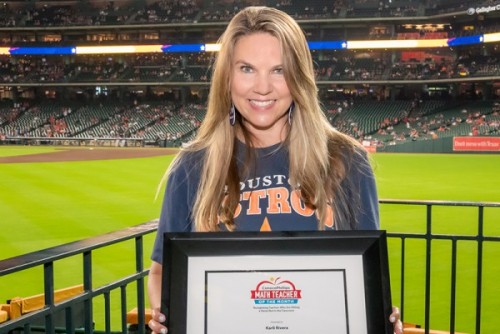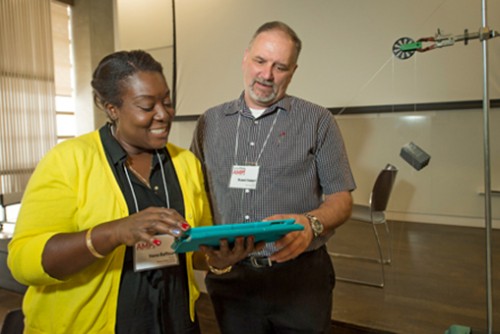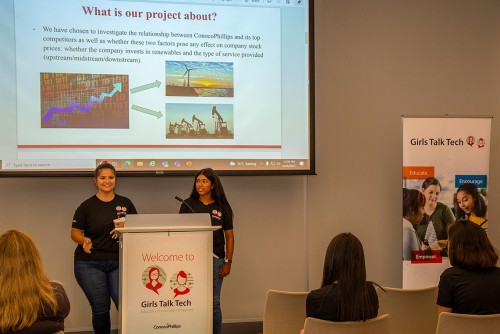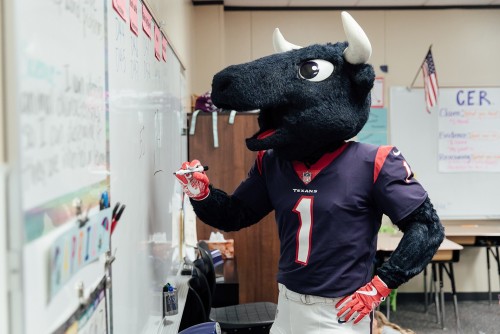PHOTO: ConocoPhillips employee Jared Leigh films his Problem Solvers segment.
By Gus Morgan
Math makes dreams possible.
That’s the underlying message five ConocoPhillips employees share in a series of educational videos for elementary-age students.
Math in a Flash helps 7- to 9-year-olds build their math confidence through animated math problems.
- Math in a Flash is a partnership between ConocoPhillips and United Way of Greater Houston .
- The Math in a Flash Problem Solving series won a Telly Award in 2021.
In these 60-second segments called Problem Solvers, Jared Leigh, Maxine Madison, Juan Vargas, Kristen Petry and Britiany Hayes explain how they use math in their work activities. Such tasks include designing crude oil tankers, reducing emissions, discovering oil, safeguarding computers and planning well sites.
The Problem Solvers videos compliment the Math in a Flash videos, 30-second segments that feature an animated math problem. Fun and digestible, the Math in a Flash videos teach 7- to 9-year-olds how to solve problems using multiplication, fractions, graphing, angles and shapes.
These segments have been viewed across the greater Houston area, receiving more than 5.7 million impressions in 2021 and accumulating more than 24.4 million total impressions since the program’s inception.
Let's take a closer look at these five Problem Solvers, math advocates who aren't shy about sharing their enthusiasm for numbers and calculations:
Jared Leigh – ‘Kids are our next generation of problem solvers’
Staff Marine Project Advisor Jared Leigh uses math to design ships, offshore floating structures and marine export terminals.
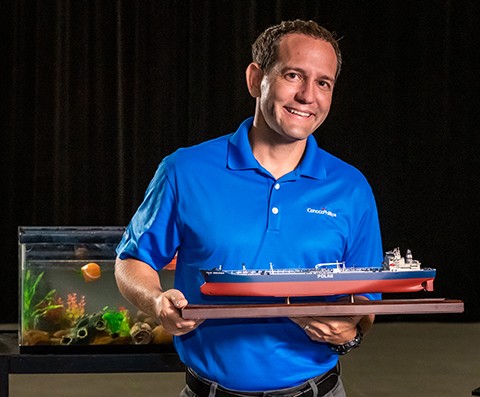
“Math is exciting to me because we use it every day to do things like power civilization, solve problems, advance society and overcome challenges.”
Since kids often struggle with what they want to be when they grow up, Jared said, they don’t always connect how their educational choices lead to specific career paths.
“Kids are our next generation of problems solvers. So, showing how math applies to a job allows students to bridge this gap and better understand how what they are doing in math class is developing useful knowledge for their future.”
Learning math requires effort and determination, Jared said, an educational undertaking that involves both success and failure.
“Getting a math problem wrong but then figuring out why is a great learning opportunity.”
Maxine Madison – ‘ The rewards are endless’
Climate Risk Advisor Maxine Madison uses math to calculate emissions reductions.
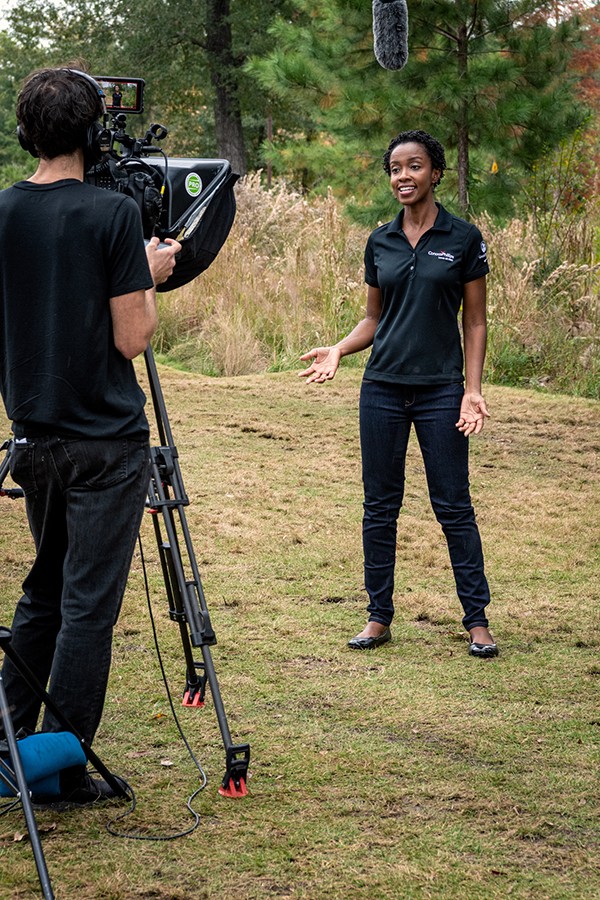
“I use math daily to determine the difference between our emissions last year compared to this year, and this helps us to track our progress towards meeting our emissions targets and net-zero emissions ambition.”
Math has enabled incredible achievements, Maxine said, such as going to the moon and building the pyramids.
“If we want to create something great, it usually involves math.”
Getting kids excited about math, Maxine said, can be as simple as finding out what things they are interested in and showing them how math relates to it.
“For example, if a child was interested in baseball, I would talk about the trajectories of the ball and how that can teach them math skills and maybe improve their game at the same time.”
Maxine said learning new math concepts can be challenging, so don't be afraid to ask for help.
“The key to my math success was asking for help with areas that I didn’t understand and talking with others who were better at math than I was. Don’t be afraid to ask your teacher for help or find a study partner or a tutor who is able to help you. My mother always said that nothing worth having comes easily. So even though it may be difficult initially to understand math, once you’ve mastered it, the rewards are endless.”
Juan Vargas – Math as a ‘universal language’
Senior Completions Engineer Juan Vargas uses math to find and produce oil and gas.

“Math is the only universal language in the world that explains how things work and interact together. Without math, we wouldn’t have cars, planes, boats, computers, lights, videogames, or cellphones. Almost every aspect of life today has some form of math involved.”
At an early age, Juan enjoyed solving puzzles. To make math fun, he started treating math problems like he would a puzzle or game, allowing him to learn without feeling like he was doing work.
“Math requires practice and patience to fully understand. Everyone learns at different speeds, but the more you practice, the better you will become. I’ve learned the trick to math is to do it consistently. Since so much of math builds upon previous lessons, you want to ensure your foundation is secure before jumping to the next topic.”
Kristen Petry – Math can ‘ open doors for you’
Information Technology Auditor Kristen Petry uses math to keep computers safe and analyze data.
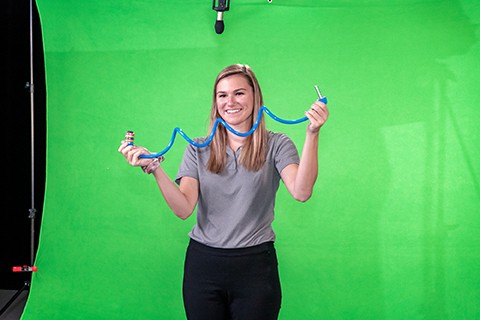
“Math is important because it can open doors for you. A lot of college majors have math requirements. If you are strong in math, you can do anything in STEM. It also teaches valuable problem-solving thinking that you can apply to any aspect of life. It is important to practice thinking about complex issues in systematic and logical ways.”
When Kristen was in elementary school, she disliked memorizing rules and multiplication tables.
“But once I had the basics, I thrived in upper-level math, which involves more problem solving and logical thinking. Don’t get discouraged. Math has so many different versions. If one concept is difficult to grasp, the next concept will probably come more naturally.”
And once you see how to apply math to everyday situations, Kristen said, it can change your perspective and make you want to learn more.
“Math can be so fun. Be patient. If you feel like you’re bad at math or it’s boring, just keep going. You might find a different math class that changes your attitude.”
Britiany Hayes – ‘Have patience with yourself’
Land Analyst Britiany Hayes uses math to calculate budgets and estimate the value of company assets.
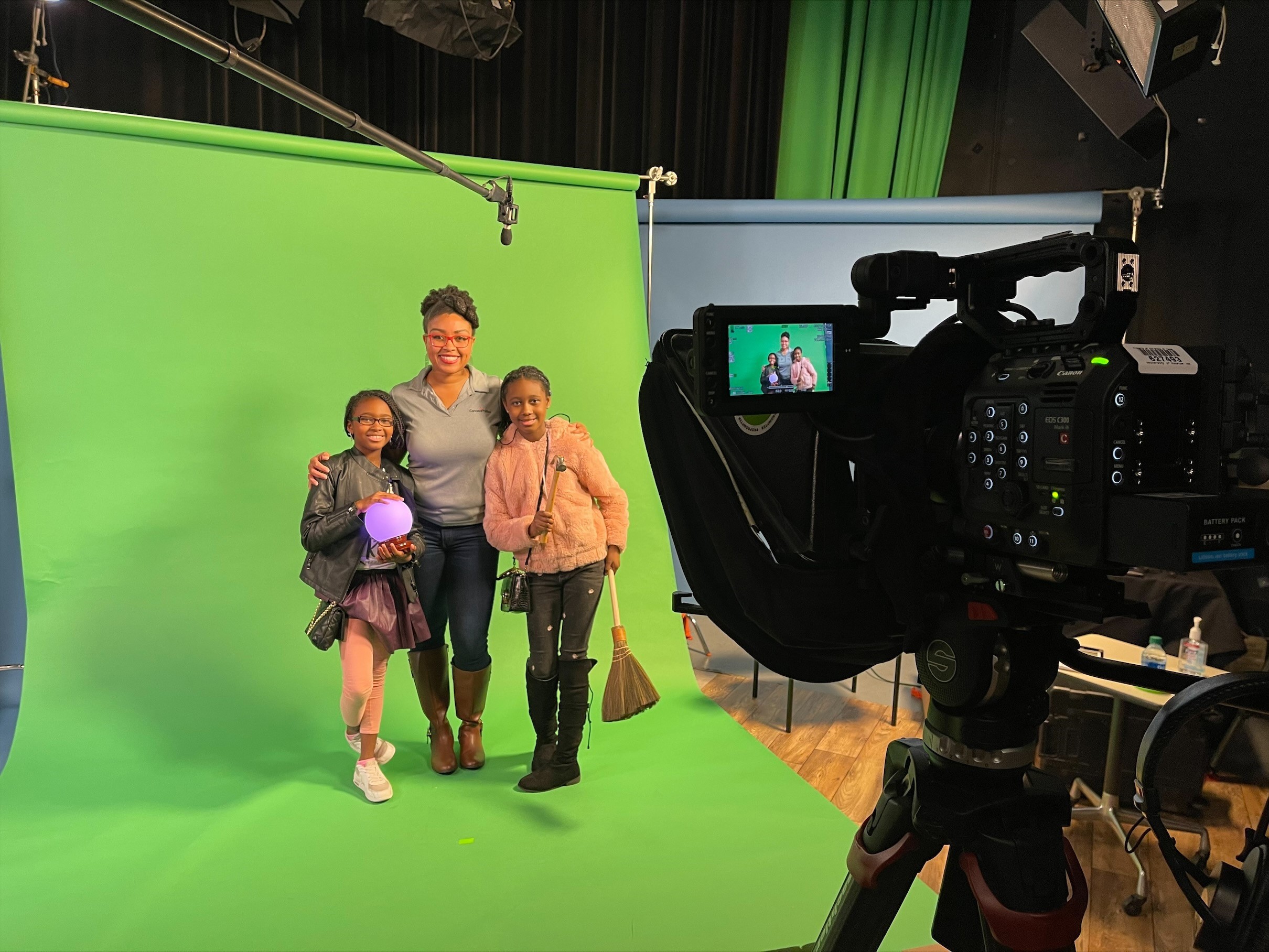
Although Britiany struggled with math from the beginning, she eventually transformed herself into a problem-solving prodigy.
“My mom is a big believer in working through things no matter what, so I was in math camps and had math tutors throughout my school life. Over time, it clicked, and I did really well. And once I was in college, it really clicked.”
What’s Britiany’s secret to math success?
“Always break it down. Take it a piece at a time, that always makes it easier. And have patience with yourself because once you've put in the work and then you do understand it, which you will, you'll be so proud of yourself.”
When it comes to learning math, Britiany said persistence and determination are vital to your progression.
“Some concepts may click with little to no effort. For others, you may have to work a bit harder. Don't give up on math because it's something concrete that you can count on.”

